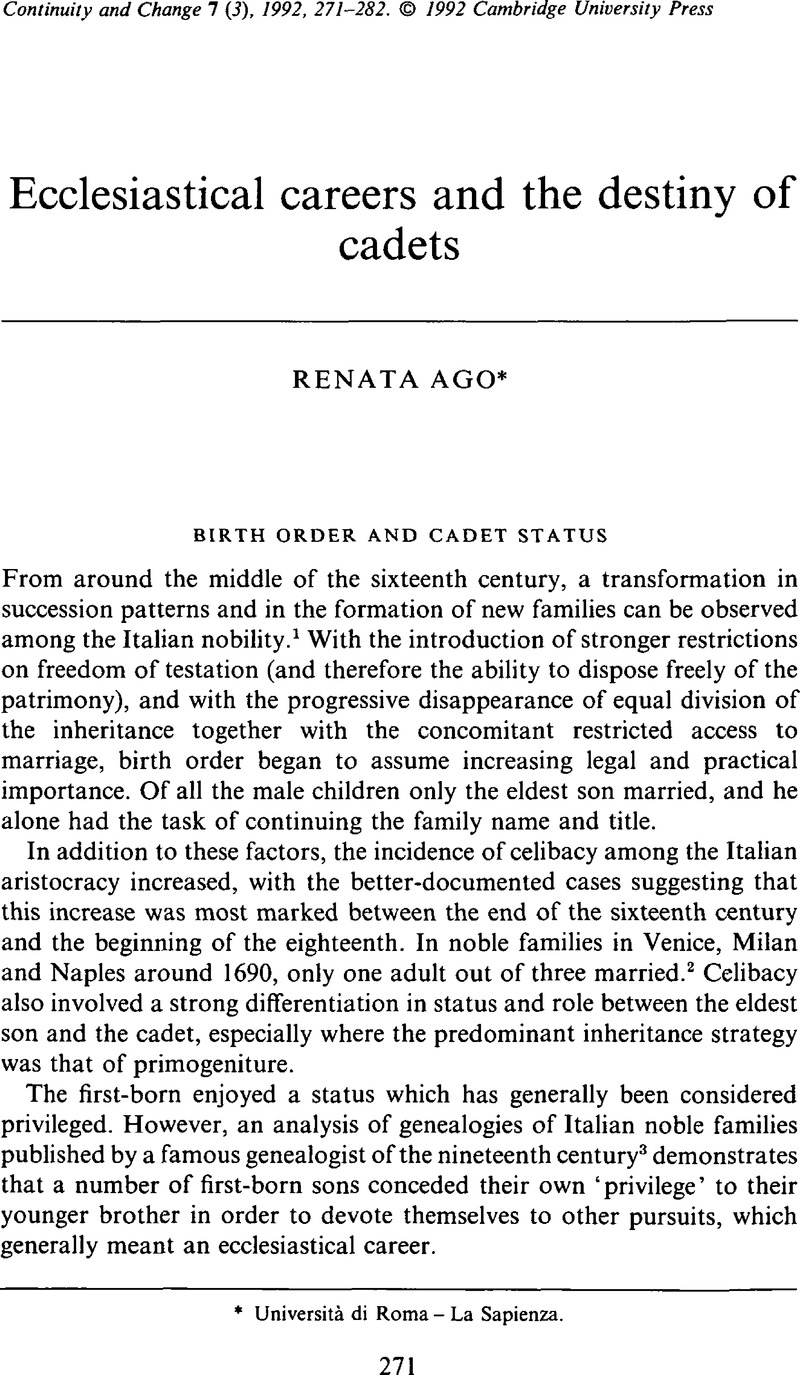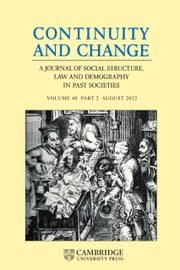Article contents
Ecclesiastical careers and the destiny of cadets
Published online by Cambridge University Press: 11 November 2008
Abstract

- Type
- Articles
- Information
- Copyright
- Copyright © Cambridge University Press 1992
References
ENDNOTES
1 For a European view of the issue, see Cooper, J. P., ‘Patterns of inheritance and settlement by great landowners from the sixteenth to seventeenth centuries’, in Goody, J., Thirsk, J. and Thompson, E. P. eds., Family and inheritance: rural society in Western Europe 1200–1800 (Cambridge, 1976).Google Scholar
2 See Davis, J. C., The decline of the Venetian nobility as a ruling class (Baltimore, 1962)Google Scholar; Zanetti, D., La demografia del patriziato milanese nei secoli XVII, XVIII, XIX (Pavia, 1972)Google Scholar; and Delille, G., Famille et propriété dans le Royaume de Naples (Rome, 1985).CrossRefGoogle Scholar
3 Litta, P., Famiglie celebri italiane (Milan, 1842– ).Google Scholar
4 ibid., and Archivio del Vicariato di Roma (hereafter AYR), ‘Ottoboni’.
5 Archivio di State di Roma (hereafter ASR), ‘Spada Veralli’, b.459, letter of 26 07 1609.
6 ASR, ‘Notai della Camera Apostolica’, b.1474, c.198: ‘Only one of them must marry. If the one who marries has no children, then another one, not according to age but the one who is most fit to bear the burden of marriage’ (emphasis mine).
7 ASR, ‘Spada Veralli’, b.611, letter of 9 Apr. 1661.
8 ASR, ‘Notai della Camera Apostolica’, b.1474, c.7.
9 Brizzi, G. P., La formazione della classe dirigente nel Sei-Settecento (Bologna, 1976).Google Scholar
10 ASR, ‘Notai dell' Auditor Camerae’, b.4, c.6.
11 That is to say in civil law and canon law.
12 See Ago, R., Carriere e clientele nella Roma barocca (Roma-Bari, 1990).Google Scholar
13 ASR,‘Giustiniani’, b.8.
14 ibid.
15 ibid.
16 Archivio Doria Pamphili, Rome, b.201, c.295.
17 ibid., c.277.
18 AYR, ‘Ottoboni’, b.ZZ, letter of 23 Feb. 1668.
19 ibid.
20 ibid., b.DD, letter of 17 Feb. 1682 (italics mine).
21 ibid., s.d.
22 ASR, ‘Notai della Camera Apostolica’, b.1474, c.262.
23 See Reinhardt, V., Kardinal Scipione Borghese (1605–1633), Vermogen, Finanzen und Aufstieg eines Papstnepoten (Tübingen, 1984).Google Scholar
24 See Ago, , Carriere e clientele.Google Scholar
25 See Delille, , Famille et propriété.Google Scholar
26 I have therefore used the wills as a source for the investigation of strategies, more than as documents for analysing property transmission.
27 ASR, ‘Notai della Camera Apostolica’, b.1474, c.6.
28 ibid., c.7.
29 ibid., c.80: ‘so that he can set his sons Jacques and Jean to the study of good literature’.
30 ibid., c.7.
31 The Venetian nobles too used the fideicommissum for this purpose, without relying on primogeniture; see Davis, , The Decline.Google Scholar
32 ibid., c.198: ‘from the fruits of which …they can support themselves comfortably’; ‘let them put together the aforesaid fruits, income and proceeds from the above-mentioned property in order to live with greater dignity’.
33 ibid., c.262.
34 ibid., c.156.
35 ibid., c.29.
36 ibid., c.328.
37 About the genealogies and their meaning, see also the issue of Annales E.S.C. (1991; 4) which is devoted to ‘La culture généalogique’.Google Scholar
- 4
- Cited by


